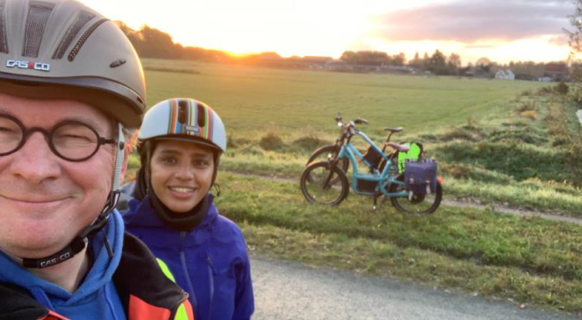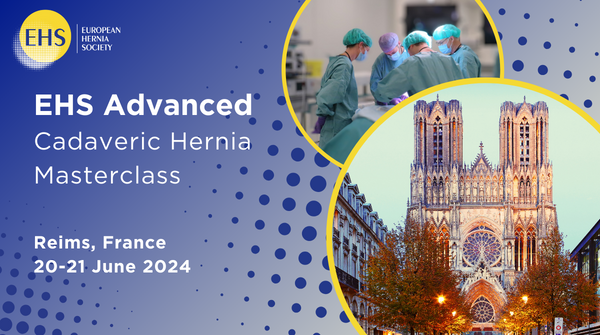Deena Harji
EHS Travel Grant winner
ehs_travelling_fellowship_report.pdf
Plastic Surgery for a repair of diastasis recti – and we were done
EHS Travelling Fellowship Report The European Hernia Society Travelling Fellowship provided me with the opportunity to visit Professor Filip Muysoms in Ghent in November 2021. Being provided with the opportunity to spend time with and observe the world leading robotic abdominal wall surgeon has been one of the key highlights of my robotic career so far. Professor Muysoms put together an action-packed week together for me, including, theatre case observations, robotic proctoring and cadaveric operating and teaching.
EHS Travelling Fellowship Report
The European Hernia Society Travelling Fellowship provided me with the opportunity to visit Professor Filip Muysoms in Ghent in November 2021. Being provided with the opportunity to spend time with and observe the world leading robotic abdominal wall surgeon has been one of the key highlights of my robotic career so far. Professor Muysoms put together an actilastic Surgeryon-packed week together for me, including, theatre case observations, robotic proctoring and cadaveric operating and teaching.
Day one kickstarted with case observations in theatre, with a full and varied theatre list, consisting of three robotic TAPP repairs for inguinal hernias, an open umbilical hernia repair, a robotic Sugarbaker hernia repair for a recurrent parastomal hernia and a joint case with Plastic Surgery for a repair of diastasis recti – and we were done by 6pm! The efficiency and dynamism of the theatre team was impressive, and is clearly the foundation of a successful, high volume robotic programme. There were many pearls of wisdom shared throughout the day regarding robotic hernia surgery including case selection, acquisition of robotic hernia skills, building in complexity into a robotic hernia programme and training future robotic surgeons. In between cases, Professor Muysoms showcased some of his amazing hernia-related art – can you spot the mesh?!
Travelling Fellowship provided me with the oppomage captures of robotic parastomal and inguinal hernia repair.
Following on from our fruitful day in theatre, we hopped into the e-car for an adventure to Herne, Germany. Our road trip of 300 kilometres across the European continent consisted of good music, great company, and more conversations about robotic surgery. The following morning, we went to the Marien Hospital in Herne, to proctor Dr Omar Thaher for his first day of robotic hernia operating. It was an interesting and insightful experience to be able to observe a robotic maestro proctor and train an established but novice robotic surgeon. There are several subtle distinctions between being ‘trained’ and being ‘proctored’; the aim of proctoring is to train the surgeon in the technical aspects of using the robotic system, as opposed to training in the key components of the operative procedure, with the overall clinical responsibility for the patient assigned to the surgeon being proctored. Understanding and executing effective proctoring requires a balanced approach coupled with mutual understanding and respect between the two surgeons, something which Professor Muysoms executed with finesse. As a robotic surgeon who is fellowship trained and who has started training junior robotic surgeons, it was interesting for me to observe these key differences in training approaches. After two, very well executed robotic Transabdominal Retromuscular Umbilical Prosthetic Hernia Repair (TARUP) procedures, performed by Dr Omar Thahur and proctored by Professor Muyusoms, we made our journey back to Ghent.
The following morning, we cycled 26km to the ORSI Academy through the beautiful, lush green suburbs of Ghent, for a hands on cadaveric robotic hernia training day. The ORSI academy is a state-of-the-art training facility for trainees and surgeons and houses several robotic platforms. The day kickstarted with an overview of the current evidence for robotic hernia repair, lectures on setting up a robotic hernia practice and hands-on training with the Da Vinci Intuitive Robotic system. At the end of the day, I was lucky enough to be able to test drive the Medtronic Hugo system along with Professor Muysoms. As someone who is interested in multiplatform robotic operating this was one of many highlights of the visit and it was really interesting to spend some time with the Medtronic team and understand their direction and vision for robotic surgery in the future.
On my final day, we cycled to Ghent University to participate in the Belgium Society of Abdominal Wall Hernia Society Hernia Cadaveric course for residents and trainees, where I participated as a member of the faculty. It was brilliant to see so many trainees enthusiastic and keen to learn about hernia surgery. The day consisted of several talks followed by hands-on cadaveric sessions on all aspects of hernia surgery including TAPP and TEPP inguinal hernia repair, IPOM ventral hernia repair and Rives-Stoppa approach to abdominal wall reconstruction. Teaching the next generation of surgeons the key principles and approaches to hernia surgery was a hugely rewarding experience and is essential in ensuring that high quality surgical standards are maintained in hernia surgery going forwards.

The EHS travelling fellowship provided me an in-depth and expert insight into the world of robotic hernia surgery, with a better understanding of the key building blocks of an efficient and effective robotic team, how to build a robotic hernia programme and key insights into robotic training and proctoring. I am hugely grateful to Professor Muysoms and his family for the incredibly warm welcome into their home and for their generous hospitality. I shared many great evenings, food, conversations and laughter with them all. I also got to meet the famous hernia dog – Bommel! Professor Muysoms has provided me with an invaluable clinical experience, unique insights and new friendships. A highly recommended visit for all interested in robotic hernia surgery!



